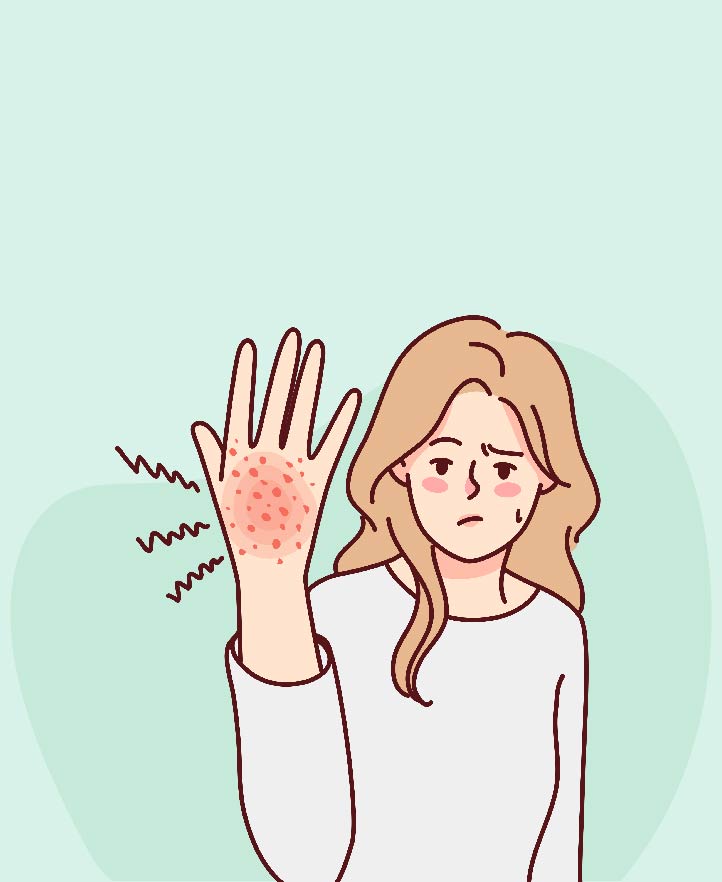

Is Psoriasis Hereditary?
Psoriasis is one of the most common autoimmune disorders. It is a chronic skin condition common among millions of people across the world. Though not contagious, it can be both physically uncomfortable and emotionally challenging, especially when flare-ups interfere with daily life. Currently, there is no permanent cure for psoriasis, but the symptoms can be managed with different treatments. In this blog, we will discuss about “Is psoriasis hereditary?” and take a closer look at the common triggers that can worsen it.
What Is Psoriasis and What Causes It?
Psoriasis is an autoimmune skin condition that causes itchy, scaly patches, swelling, redness and inflammation. These patches appear anywhere on the body, but they are most commonly seen in your arms, legs and scalp.
This condition occurs when a person’s immune system involuntarily damages the new skin cells. This leads to an exponential increase in the production of new skin cells in your body. These fight to get to the skin’s surface. Naturally, the skin cells already on the surface start to come out. This process leads to the formation of scale-like patches on your skin. As the condition progresses, these patches start to develop other issues like itching and irritation.
Like most autoimmune disorders, the main trigger for psoriasis has not yet been identified by doctors. However, research over the years suggests that a combination of genetic and environmental factors can trigger or worsen the condition.
Is Psoriasis Genetic?
According to the National Psoriasis Foundation (NPF), if one parent is diagnosed with psoriasis, there is a 28% chance of the child being diagnosed with it as well. This number goes up exponentially to 65% if both parents are diagnosed with psoriasis.
Though psoriasis can affect people of all age groups, it is most common in people aged between 15 and 35. In the recent past, more and more people under the age of 10 and 20 have been diagnosed with psoriasis, and gene mutations are the main reason for the same. In only rare cases, people get infected with psoriasis, even when they don’t have a family history of this condition.
Based on different studies on gene mutations and the relationship between genetics & psoriasis, the two most common genes believed to be causing psoriasis are:
• CARD14
First identified in 2012, this gene can cause skin inflammation leading to psoriasis. An interesting thing about this gene is that it can cause psoriasis even on its own.
• IL23R
This gene impacts the functioning of your immune system and increases the inflammatory response.
Despite these studies, a lot of information is yet to be discovered about the role of genes in psoriasis. Which exact gene passed from the parent to the child that triggers psoriasis is still a big question that scientists are trying to find out.
Other Factors that Can Trigger Psoriasis
Some other factors that trigger psoriasis apart from genetic mutations are:
• Inflammation and pain in the joints, leading to psoriatic arthritis
• Environmental factors like dry or cold climatic conditions, pollution, etc.
• Medications like beta-blockers, lithium, anti-malarial drugs, etc.
• Stress caused due to an injury or trauma
• Certain severe infections like HIV, strep throat, papillomavirus infections and retrovirus infections
• Skin trauma arising from Koebner’s phenomenon (happens mostly because of tattoos, vaccinations, bug bites, sunburns, etc.)
• Metabolic syndrome (occurs because of being overweight or obese)
• Heavy drinking and smoking
Can Gene Therapy Help Treat Psoriasis?
Gene therapy is a relatively new form of treatment that works by altering a person’s genes to help treat or cure diseases. At present, it has only been approved for certain types of cancer and a rare inherited eye condition called Leber congenital amaurosis.
Although gene therapy is not currently used to treat psoriasis, clinical trials are underway to assess its safety and effectiveness for this condition.
Common Treatments for Psoriasis
Currently, some of the psoriasis treatments used to manage the symptoms are:
• Topical treatments
Usually, topical treatments recommended to treat psoriasis contain salicylic acid, tazarotene, vitamin D, etc.
• Phototherapy
Ultraviolet B and psoralen and ultraviolet A light rays are considered the first line of treatment for psoriasis therapy.
• Systemic drugs
These drugs can be taken in the oral or injectable form. Doctors recommend this only if your psoriasis symptoms don’t get better with topical treatments or phototherapy.
• Biologic drugs
These drugs are usually given with an injection or IV infusion. They work by targeting and blocking specific cells and proteins in the immune system that are linked to the development of psoriasis.
• Lifestyle changes
Eating a balanced and nutritious diet, staying physically active and managing stress in healthy ways can all make a positive difference. Regular exposure to morning sunlight can also help, as it provides a natural source of vitamin D. Additionally, using the right type of moisturiser can keep the skin hydrated and reduce dryness or irritation.
Conclusion
Psoriasis can be caused due to many triggers, and genetic factors are just one of them. It is safe to wait for more studies to prove the role of genetics in this condition. If you experience symptoms such as red, scaly patches or itching, it's best to consult a doctor early. Managing psoriasis often involves long-term care, which can become expensive. That’s why it's wise to explore health insurance online that includes coverage for chronic skin conditions and specialist treatments, so you are financially prepared for ongoing care.
One of the important components of our overall wellness is also being financially secured. Healthcare emergencies can happen any time, but a good health insurance policy can protect you from such uncertain situations. To know more about Wellness and other health related tips, visit the wellness corner.
Disclaimer: This blog provides general information and discussions about health and related subjects. The information and other content provided in this blog, website or any linked materials are not intended and should not be considered or used as a substitute for medical advice, diagnosis, or treatment. Kindly contact your doctor before starting a new medicine or health regime.
Related Articles
Psoriasis - Symptoms and Causes
Summer Sun & Psoriasis: Relief Tips for Flare-Ups
Scalp Psoriasis vs. Dandruff: How to Tell the Difference
Types of Dandruff: Causes, Treatment, Prevention
Published on July 10, 2025















 Health Insurance
Health Insurance  Travel Insurance
Travel Insurance  Car Insurance
Car Insurance  Cyber Insurance
Cyber Insurance  Critical Illness Insurance
Critical Illness Insurance
 Pet Insurance
Pet Insurance
 Bike/Two Wheeler Insurance
Bike/Two Wheeler Insurance  Home Insurance
Home Insurance  Third Party Vehicle Ins.
Third Party Vehicle Ins.  Tractor Insurance
Tractor Insurance  Goods Carrying Vehicle Ins.
Goods Carrying Vehicle Ins.  Passenger Carrying Vehicle Ins.
Passenger Carrying Vehicle Ins.  Compulsory Personal Accident Insurance
Compulsory Personal Accident Insurance  Travel Insurance
Travel Insurance  Rural
Rural